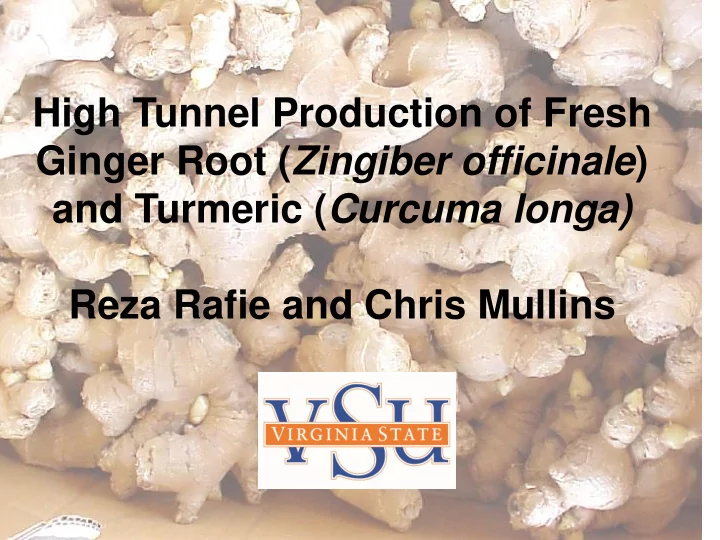

High Tunnel Production of Fresh Ginger Root ( Zingiber officinale ) and Turmeric ( Curcuma longa) Reza Rafie and Chris Mullins
What is a High Tunnel? • Resembles a conventional greenhouse • Most often unheated, could have supplementary heating • Crops are grown in the soil • Season extension – Spring earliness – Fall extension • Protects crops from adverse environmental conditions • Simple structure, inexpensive
Some Benefits of High Tunnel Crop Production • Extension of the spring and fall growing seasons – 5-8 ̊ F • Reduced temperature and moisture fluctuations during the growing season • Reduce wind damage • Reduced disease pressure • Ability to use biological pest control • Increased yield
Opportunities • Season extension and out of season growth – Maximum yield and increased quality – Less insect and disease pressure • Organic • Locally grown • Specialty crops
Challenges • Marketing • Production – Unique crop considerations – Higher production costs – Different production techniques/environme nt • Competition
Brace Purlin Bow Ground Stake
Single Bay Multibay PVC
USDA-NRCS Funding • Pilot project launched Dec. 2009 to increase availability of locally grown food • Under “Know your farmer, know your food” initiative • In Virginia program, over $190K awarded to farmers
High Tunnel Costs • Materials = approximately $3- 4/SF • Construction = $1- 2/SF • Example – 26’ x 96’ round tunnel • materials $8,735 • construction $3,744
High Tunnel
Ginger (Zingiber officinale) The official name Zingiber drived, using the Indian Sanskrit name for ginger - singabera , or shaped like a horn. Other spices in the same family with ginger are Tumeric and Cardamom . http://www.herbs2000.com/herbs/herbs_ginger.htm
Ginger plant The ginger plant has a long history of cultivation, having originated in Asia. Ginger is considered a tropical plant, has dark-green erect steams and lanced-shaped leaves that produces underground rhizomes. The plant may reach 2-4 ft in height.
Ginger Seed Rhizomes http://www.ctahr.hawaii.edu/oc/freepubs/pdf/scm-8.pdf: Paul Hepperly and Francis Zee
Ginger Seed-Rhizome - Use only mature, clean, disease-free ginger hands - Cut the selected hands into 2-4 oz sections, sterilizing the knife after each cut - Each seed-piece should have two to four well developed “eyes.” - Surface -sterilize the seed-pieces in a 10% solution of household bleach (1 part bleach in 9 parts water) for 10 minutes - Cure the seed-pieces in a clean, disease-free area for three days or more before planting ( Hepperly, P. and Francis Zee, 2004 )
In April the potted plants are ready to be transplanted in the high tunnel. In February, plant the seed piece in a one gallon pot ½-¾ filled with soilless potting mix (2 parts Compost, 2-4 parts Sphagnum Peat Moss, 1 part Perlite, and 1 part Vermiculite). Maintain in a greenhouse.
May August
September
Fertilizer • Ginger responds well with adequate fertilizer application. • For detail of fertilizer need see • http://www.ctahr.hawaii.edu/oc/freepubs/pdf/SCM-8.pdf
Mounding (Hilling) Is the periodic covering of the upward-expanding rhizomes. It is an important process in ginger production.
Baby Ginger
Mature Ginger Baby Ginger
Armyworm, Pseudaletia unipuncta potential problem with high tunnel ginger production
leaf-spot Phyllosticta zingiberi
Diseases • Bacterial wilt ( Pseudomonas solanacearum ) - wilt of entire plant, rhizome rot. • spreads by infested soil adhering to hands, boots, tools, vehicle tires and field equipment, water from irrigation or rainfall, and infected ginger rhizomes (Janse 1996). • Infects ginger roots and rhizomes through openings where lateral roots emerge or wounds caused by handling, parasitic insects or root-knot nematodes (Swanson et al. 2005). • The pathogen survives in soils within infected plant debris in soils and as free bacteria. • Crop losses: Crop loss can be complete in heavily infested soils.
Bacterial streaming from an infected Milky, bacterial ooze forming the cut surface of a discolored, infected ginger rhizome ginger rhizome suspended in water. The streaming begins only a few minutes after placing the cut rhizome http://cms.ctahr.hawaii.edu/gingerwilt/Symptoms.aspx in water
Diseases • Bacterial soft rot ( Erwinia sp.) - Leaf, pseudo stem and rhizome rot. • Bacterial leaf blight ( Xanthomonas sp.) - Leaf blight. • Fusarium yellows and rhizome rot ( Fusarium oxysporum f. sp. zingiberi ) - Wilt of entire plant, rhizome rot. • Pythium soft rot ( Pythium graminicola, P. splendens and P. aphanidermatum ): root rot, and soft rot of rhizomes .
Rhizome Rot Fusarium oxysporum
Harvest begun: Field and High tunnel 10/8/2013 Harvest ended: Field, 10/31/2013 and High tunnel, 12/05/2013
Ginger weight per plant (gr.), September 11- October 21, 2015, VSU Randolph Farm 6000 5000 4000 3000 2000 1000 0 1 1 1 1 1 2 3 1 2 1 2 1 2 3 1 2 9/11 9/16 9/23 9/28 10/12 10/12 10/12 10/15 10/15 10/16 10/16 10/19 10/19 10/19 10/21 10/21 Ginger weight (grs.) per plant, October 21-October27, 2015, VSU, Randolph Farm 6000 5000 4000 3000 2000 1000 0 3 4 5 6 7 1 1 2 3 4 1 2 3 4 5 10/21 10/21 10/21 10/21 10/21 10/23 10/27 10/27 10/27 10/27 10/27 10/27 10/27 10/27 10/27
Turmeric, Curcuma longa • Is a rhizomatous herbaceous perennial plant of the ginger family, Zingiberaceae. • It is native in Southeast Asia. Growing turmeric requires 9- 11 month from planting the rhizome seed pieces until the harvest. • In temperate zones as in Virginia, where the growing season is 7-8 month, there is a need to grow turmeric in high tunnel structure
Turmeric
Turmeric weight (grs.) per plant, September 16-October 27, 2015, VSU, Randolph Farm. 4000 3500 3000 2500 2000 1500 1000 500 0 1 1 1 2 1 2 3 4 5 9/16 9/23 10/23 10/23 10/27 10/27 10/27 10/27 10/27
Recommend
More recommend